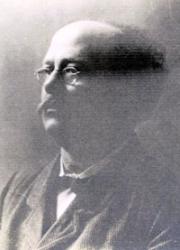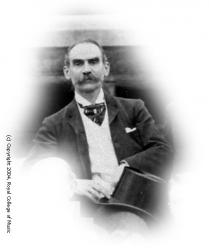Planning worship?
Check out our sister site, ZeteoSearch.org,
for 20+ additional resources related to your search.
- |
User Links
Person Results
John Bacchus Dykes

1823 - 1876 Person Name: John B. Dykes Composer of "ALFORD" in The Hymnal for Boys and Girls As a young child John Bacchus Dykes (b. Kingston-upon-Hull' England, 1823; d. Ticehurst, Sussex, England, 1876) took violin and piano lessons. At the age of ten he became the organist of St. John's in Hull, where his grandfather was vicar. After receiving a classics degree from St. Catherine College, Cambridge, England, he was ordained in the Church of England in 1847. In 1849 he became the precentor and choir director at Durham Cathedral, where he introduced reforms in the choir by insisting on consistent attendance, increasing rehearsals, and initiating music festivals. He served the parish of St. Oswald in Durham from 1862 until the year of his death. To the chagrin of his bishop, Dykes favored the high church practices associated with the Oxford Movement (choir robes, incense, and the like). A number of his three hundred hymn tunes are still respected as durable examples of Victorian hymnody. Most of his tunes were first published in Chope's Congregational Hymn and Tune Book (1857) and in early editions of the famous British hymnal, Hymns Ancient and Modern.
Bert Polman
John Bacchus Dykes
E. J. Hopkins

1818 - 1901 Person Name: E. Hopkins Arranger of "ANDREAS HOFER" in The Fellowship Hymn Book Dr Edward John Hopkins MusDoc United Kingdom 1818-1901. Born at Westminster, England, the son of a clarinetist with the Royal Opera House orchestra, he became an organist (as did two of his brothers) and a composer. In 1826 he became a chorister of the Chapel Royal and sang at the coronation of King William IV in Westminster Abbey. He also sang in the choir of St. Paul’s Cathedral, a double schedule requiring skill and dexterity. On Sunday evenings he would play the outgoing voluntary at St. Martin’s in-the-field. He left Chapel Royal in 1834 and started studying organ construction at two organ factories. He took an appointment at Mitcham Church as organist at age 16, winning an audition against other organists. Four years later he became organist at the Church of St. Peter, Islington. In 1841 he became organist at St. Luke’s, Berwick St., Soho. Two Years later he was organist at Temple Church, which had a historic organ (built in 1683). He held this position for 55 years. In 1845 he married Sarah Lovett, and they had four sons and five daughters. He was closely associated with the Bach Society and was organist for the first English performances of Bach’s St. Matthew Passion. In 1855 he collaborated with Edward Rimbault publishing “The organ, its history and construction” (3 editions 1855-70-77). In 1864 he was one of the founders of the “College of organists”. In 1882 he received an honorary Doctorate of Music from the Archbishop of Canterbury. He composed 30+ hymn tunes and some psalm chants, used by the Church of England. He died in London, England.
John Perry
E. J. Hopkins
W. G. Tarrant
1853 - 1928 Person Name: William G. Tarrant Author of "The Fathers Built This City" in The Hymnal for Boys and Girls Tarrant, William George, B.A., b. 1853. Since 1883 Minister of the Wandsworth Unitarian Christian Church. Editor of The Inquirer, 1888-97. One of the editors of the Essex Hall Hymnal. 1890, and of the Revised ed., 1902.
1. Come, let us Join with faithful souls. The Faithful.
2. Draw nigh to God; He will draw nigh to you. The Divine Helper.
3. Long ago the lilies faded. The Constant Presence.
4. The Light along the ages. Easter.
5. With happy voices ringing. Children's Praise.
--John Julian, Dictionary of Hymnology, New Supplement (1907)
W. G. Tarrant
John Farmer

1836 - 1901 Person Name: John Farmer (1836-1901) Composer of "FARMER" in Christian Song Born: August 16, 1835, Nottingham, England.
Died: July 17, 1901, at his home in Oxford, England.
Buried: St. Sepulchre’s Cemetery, Jericho, Oxford, England.
Eldest child of butcher John Farmer and milliner Mary Blackshaw Farmer, John learned to play the piano, violin, and harp when young. He was apprenticed to his uncle Henry Farmer, an organist, composer, and music teacher with a music and musical instrument business in Nottingham. At age 14, John went to study at the Leipzig Conservatory, then three years later under Andreas Spaeth in Coburg for a year. He returned to England in 1853, and entered his father’s lace business. After his mother’s death in 1856, he went to Zürich, Switzerland, where he taught music. He returned to England again in 1861, and became music master of Harrow School in 1864, staying there until 1885. He then accepted an invitation to become organist at at Balliol College, Oxford, where he founded the Balliol Concerts.
During his career, Farmer composed oratorios, cantatas, church music, chamber music and numerous school songs, especially for Harrow School. One of his best known compositions was "Forty Years On," which he wrote at Harrow in 1872. While at Balliol, he composed Warwick School’s first school song, "Here’s a Song For All", in 1892. His other works include:
Cinderella
The oratorio Christ and His Soldiers
The cricketing song "Willow the King"
Music: FARMER
© The Cyber Hymnal™ (www.hymntime.com/tch)
John Farmer
Johann Wolfgang Franck
1644 - 1710 Composer (melody) of "KOMM, SEELE" in The Beacon Song and Service book Born: June 1644 (baptised: June, 17 1644) - Unterschwaningen
Died: c1710 - ?
Johann Wolfgang Franck was a German composer, who served at the court of the Margrave of Ansbach from 1665 to 1679 (or from 1673 to 1678). He composed a considerable body of sacred music for the court chapel, and in 1677 was made court chaplain. In January 1679 he was forced to flee after murdering one of the musician of the chapel and wounding his wife in a fit of jealousy. Already known as an opera composer through e.g. Die drey Töchter des Cecrops (the first extant German opera in full score), he found asylum in Hamburg, becoming musical director of the T am Gänsemarkt. Kapellmeister at Hamburg Cathedral from 1682 to 1686. In Hamburg he produced 14 operas between 1679 and 1686. From 1690 to 1695 he was in London, in whose concert life he was an active participant. In conjunction with Robert King, he gave there concerts between 1690 and 1693, and in 1695 he wrote a song for Colley Cibber's Love's Last Shift.
Apart from his operas, Johann Wolfgang Franck wrote several books of sacred songs, also a number of songs for The Gentleman's Journal (1692-1694).
--www.bach-cantatas.com/Lib/
Johann Wolfgang Franck
H. J. Storer
1860 - 1935 Person Name: Henry J. Storer Composer of "PATMOS" in The Hymnal b. Cambridge, Mass., 1860; d. Belmont, Mass., 1935; composer and teacher
H. J. Storer
Alfred J. Caldicott

1842 - 1897 Person Name: Alfred James Caldicott, 1842-1897 Composer of "CIVITAS DEI" in The Cyber Hymnal The eldest son of a hop merchant and amateur musician at Worcester, the Alfred James Caldicott was born there on November 26, 1842. Like his six brothers, he was a chorister in the Cathedral choir, and at the age of fourteen was articled to the late Mr. Done, the Cathedral organist. He subsequently entered the Conservatorium at Leipzig, where he studied under Moscheles, Hauptmann, and Plaidy. On his return to Worcester he became organist of St. Stephen's Church and to the Corporation, and also conductor of the Worcester Musical Society. In 1878 he took the degree of Bachelor in Music at the University of Cambridge, under the Professorate of Sir G.A.Macfarren. Three years later his sacred cantata "The Widow of Nain" was performed at the Worcester Musical Festival. After a short residence at Torquay in 1882, Mr. Caldicott settled in London in the following year, and was appointed a professor of harmony at the Royal College of Music.
In 1885 he became musical director of the now defunct Albert Palace at Battersea. He toured with an opera company in America, 1890–91 and was conductor at the Comedy and other theatres. Mr Caldicott is, however, best known as a composer of vocal music cast in a light vein, in which he was highly successful. For the German Reed entertainments he composed "Treasure Trove" (1883) and other operettas, thirteen in all. "John Smith" and "The Girton Girl and the Milkmaid", composed for London theatres, were of a similar nature. Two cantatas for female voices – "A Rhine Legend" and "Queen of May" – must also be mentioned. Mr. Caldicott's humorous part-songs, of which "Humpty Dumpty" (special prize, Manchester Gentlemen's Glee Society, 1878) is a highly characteristic specimen, gave the lamented composer widespread popularity.
--www.cph.rcm.ac.uk/
Alfred J. Caldicott
Johann W. Franck
1641 - 1688 Person Name: J. W. Franck, 1641-1688 Composer of "KOMM, SEELE" in At Worship
Johann W. Franck


 My Starred Hymns
My Starred Hymns


